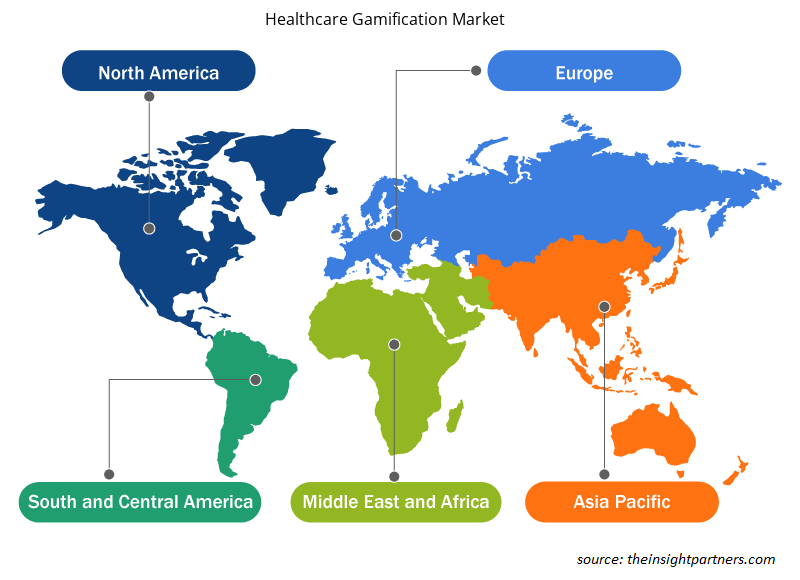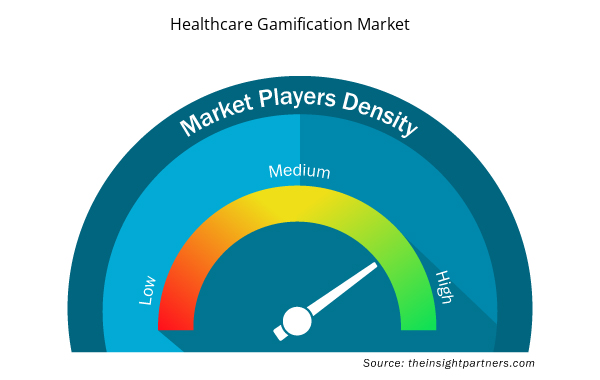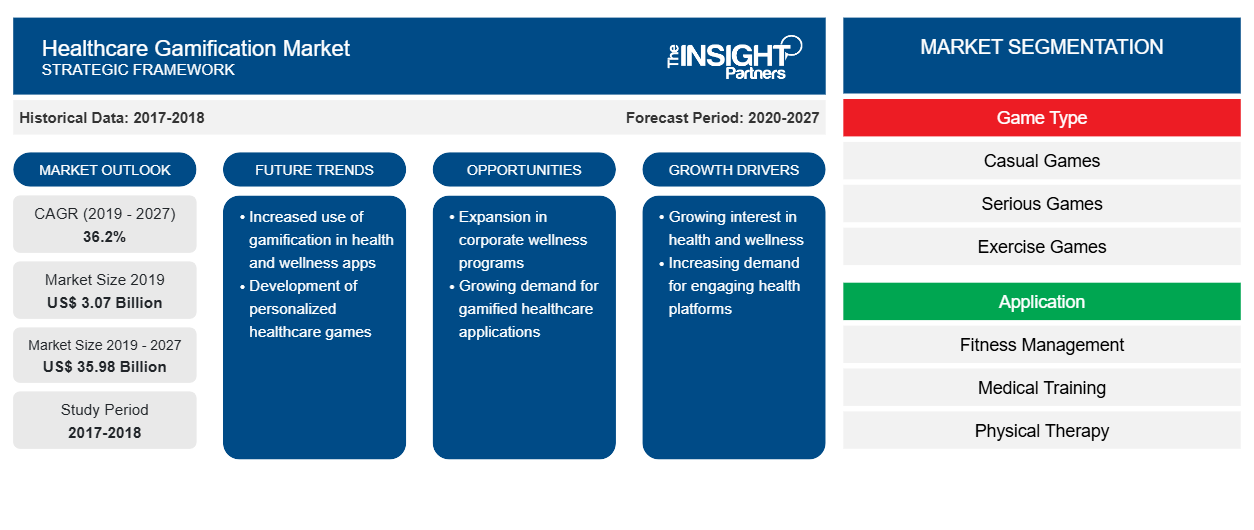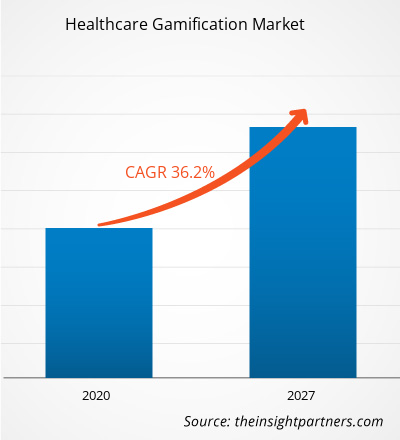[Rapporto di ricerca] Si prevede che il mercato della gamification sanitaria raggiungerà i 35.982,7 milioni di dollari nel 2027, rispetto ai 3.072,5 milioni di dollari del 2019. Si stima che il mercato crescerà con un CAGR del 36,2% dal 2020 al 2027.gamification market is expected to reach US$ 35,982.7 million in 2027 from US$ 3,072.5 million in 2019. The market is estimated to grow with a CAGR of 36.2% from 2020-2027.
La crescita del mercato è attribuita a fattori quali la crescente adozione della gamification nell'assistenza sanitaria e l'aumento del numero di lanci di tecnologie. Tuttavia, le difficoltà nell'impegno degli utenti a lungo termine probabilmente ostacoleranno la crescita del mercato.
Approfondimenti di mercato
Crescente adozione della gamification in ambito sanitario
L'introduzione dei giochi nel trattamento sanitario è iniziata all'inizio del 1975 e ha svolto un ruolo importante nella terapia del gioco. Inoltre, i giochi hanno recentemente attirato l'attenzione in termini di aspetti terapeutici con l'integrazione dell'intelligenza artificiale e della realtà aumentata nel settore sanitario. I giochi offrono ai pazienti la possibilità di esprimersi, cosa che altrimenti non accade nella maggior parte dei casi dei pazienti, aiutando così i professionisti a progettare una terapia migliore che porti a risultati di trattamento efficaci. Pertanto, si prevede che la crescente prevalenza di malattie croniche come malattie mentali e condizioni muscoloscheletriche e ortopediche, che sono curabili in una certa misura con le tecnologie di gioco, aumenterà la domanda di gamification sanitaria. La terapia del gioco si è rivelata utile nel trattamento di giovani pazienti che hanno familiarità con l'interazione costante con la tecnologia nel corso della loro vita. Inoltre, l'introduzione di nuove tecnologie come la realtà aumentata (AR) e la realtà virtuale (VR) nel settore sanitario sta aiutando i professionisti a curare le malattie mentali dei pazienti e ad assistere nelle sessioni di consulenza. Ad esempio, nel 2016, un team di game designer negli Stati Uniti ha introdotto un'esperienza DEEP-VR che guida gli utenti in un ambiente subacqueo per apprendere e combattere i sintomi di ansia e stress. Inoltre, l'incorporazione di attività fisiche nei videogiochi consente l'integrazione della VR nelle terapie riabilitative. Ad esempio, nell'ottobre 2017, gli studenti della Rice University hanno creato un videogioco chiamato Equilibrium per la terapia fisica pediatrica. Il gioco utilizza la Wii Balance Board insieme a barre bilanciate personalizzate che aiutano a far entusiasmare i bambini nel migliorare la loro capacità di camminare e imparare l'equilibrio. Pertanto, la crescente adozione della gamification per scopi terapeutici sta guidando la crescita del mercato della gamification sanitaria
Personalizza questo report in base alle tue esigenze
Riceverai la personalizzazione gratuita di qualsiasi report, comprese parti di questo report, o analisi a livello nazionale, pacchetto dati Excel, oltre a usufruire di grandi offerte e sconti per start-up e università
- Scopri le principali tendenze di mercato in questo rapporto.Questo campione GRATUITO includerà analisi di dati che spaziano dalle tendenze di mercato alle stime e alle previsioni.
Approfondimenti basati sul tipo di gioco
In base al tipo di gioco, il mercato della gamification sanitaria è suddiviso in giochi casual, giochi seri e giochi di esercizi. Nel 2019, i giochi casual hanno rappresentato la quota maggiore del mercato a causa del crescente tasso di adozione tra bambini e anziani sopra i 50 anni grazie ai suoi benefici nel migliorare le capacità cognitive e la crescente domanda sta accelerando le aziende nell'offrire un'ampia gamma di divertenti giochi casual. Tuttavia, negli anni previsti, si prevede che i giochi di esercizi cresceranno più rapidamente in quanto comprendono giochi di fitness e di movimento fisico interattivo. D'altra parte, molti operatori sanitari hanno collaborato con app di esercizi per incoraggiare sane abitudini tra gli utenti. Ad esempio, il gigante sanitario United Healthcare ha collaborato a un programma pilota con i creatori di "Dance, Dance Revolution" su un gioco adatto alle lezioni in palestra per tenere i bambini in piedi e lontani dal divano.
Approfondimenti basati sulle applicazioni
Il mercato della gamification sanitaria, per applicazione, è segmentato in fitness management, formazione medica, fisioterapia, altri. Il segmento fitness management ha detenuto la quota maggiore del mercato nel 2019. Inoltre, si prevede che lo stesso segmento registrerà il CAGR più elevato nel mercato durante il periodo di previsione.
Informazioni basate sull'utente finale
In base all'utente finale, il mercato della gamification sanitaria è segmentato in utenti aziendali e utenti consumer. Il segmento degli utenti aziendali ha detenuto la quota maggiore del mercato nel 2019 e si stima che registrerà il CAGR più elevato nel mercato durante il periodo di previsione.
I player del mercato della gamification sanitaria come Cognifit, Mango Health, Bunchball, Ayogo Health Inc, .Fitbit, Inc., Akili Interactive Labs, Inc., Nike, Inc., Cohero Health, Inc., Higi Sh Llc e Mysugr hanno adottato diverse strategie organiche e inorganiche per migliorare i loro ricavi e la loro posizione di mercato. Ad esempio, nell'ottobre 2020, TrialCard Incorporated ha lanciato una versione 2.0 di Mango Health. Questa ultima versione fornisce ai fornitori di servizi sanitari terzi l'accesso alla solida suite di moduli di supporto ai pazienti di Mango. Questa ultima versione della piattaforma Mango farà parte di un programma di supporto ai pazienti completamente integrato per il prossimo lancio di un nuovo oncolitico orale.
Approfondimenti regionali sul mercato della gamification sanitaria
Le tendenze regionali e i fattori che influenzano il mercato della gamification sanitaria durante il periodo di previsione sono stati ampiamente spiegati dagli analisti di Insight Partners. Questa sezione discute anche i segmenti e la geografia del mercato della gamification sanitaria in Nord America, Europa, Asia Pacifico, Medio Oriente e Africa e America meridionale e centrale.

- Ottieni i dati specifici regionali per il mercato della gamification sanitaria
Ambito del rapporto sul mercato della gamification in ambito sanitario
| Attributo del report | Dettagli |
|---|---|
| Dimensioni del mercato nel 2019 | 3,07 miliardi di dollari USA |
| Dimensioni del mercato entro il 2027 | 35,98 miliardi di dollari USA |
| CAGR globale (2019 - 2027) | 36,2% |
| Dati storici | 2017-2018 |
| Periodo di previsione | 2020-2027 |
| Segmenti coperti | Per tipo di gioco
|
| Regioni e Paesi coperti | America del Nord
|
| Leader di mercato e profili aziendali chiave |
|
Densità degli attori del mercato: comprendere il suo impatto sulle dinamiche aziendali
Il mercato della Gamification sanitaria sta crescendo rapidamente, spinto dalla crescente domanda degli utenti finali dovuta a fattori quali l'evoluzione delle preferenze dei consumatori, i progressi tecnologici e una maggiore consapevolezza dei benefici del prodotto. Con l'aumento della domanda, le aziende stanno ampliando le loro offerte, innovando per soddisfare le esigenze dei consumatori e capitalizzando sulle tendenze emergenti, il che alimenta ulteriormente la crescita del mercato.
La densità degli operatori di mercato si riferisce alla distribuzione di aziende o società che operano in un particolare mercato o settore. Indica quanti concorrenti (operatori di mercato) sono presenti in un dato spazio di mercato in relazione alle sue dimensioni o al valore di mercato totale.
Le principali aziende che operano nel mercato della gamification sanitaria sono:
- Cognitivo
- Salute del mango
- Mazzo di palle
- Società di consulenza sanitaria Ayogo Health Inc.
- Fitbit, Inc.
Disclaimer : le aziende elencate sopra non sono classificate secondo un ordine particolare.

- Ottieni una panoramica dei principali attori del mercato della gamification sanitaria
Mercato della gamification sanitaria – per tipo di gioco
- Giochi Casuali
- Giochi seri
- Giochi di esercizi
Mercato della gamification sanitaria – per applicazione
- Gestione del fitness
- Formazione medica
- Terapia fisica
- Altri
Mercato della Gamification Sanitaria – per Utente Finale
- Utenti aziendali
- Utenti basati sui consumatori
Mercato della Gamification Sanitaria – per Geografia
America del Nord
- NOI
- Canada
- Messico
Europa
- Francia
- Germania
- Italia
- Regno Unito
- Spagna
- Resto d'Europa
Asia-Pacifico (APAC)
- Cina
- India
- Corea del Sud
- Giappone
- Australia
- Resto dell'Asia-Pacifico
Medio Oriente e Africa (MEA)
- Sudafrica
- Arabia Saudita
- Emirati Arabi Uniti
- Resto del Medio Oriente e Africa
America del Sud e Centro
- Brasile
- Argentina
- Resto del Sud e Centro America
Profili aziendali
- Cognitivo
- Salute del mango
- Mazzo di palle
- Società di consulenza sanitaria Ayogo Health Inc.
- Fitbit, Inc.
- Akili Interactive Labs, Inc.
- Nike, Inc.
- Azienda
- Higi Sh LLC
- Il mio sugo
- Analisi storica (2 anni), anno base, previsione (7 anni) con CAGR
- Analisi PEST e SWOT
- Valore/volume delle dimensioni del mercato - Globale, regionale, nazionale
- Industria e panorama competitivo
- Set di dati Excel


- Artificial Intelligence in Healthcare Diagnosis Market
- Nuclear Waste Management System Market
- Queue Management System Market
- Virtual Production Market
- Truck Refrigeration Market
- Parking Management Market
- Procedure Trays Market
- Non-Emergency Medical Transportation Market
- Green Hydrogen Market
- Identity Verification Market

Report Coverage
Revenue forecast, Company Analysis, Industry landscape, Growth factors, and Trends

Segment Covered
This text is related
to segments covered.

Regional Scope
North America, Europe, Asia Pacific, Middle East & Africa, South & Central America

Country Scope
This text is related
to country scope.
Domande frequenti
Global healthcare gamification market is segmented by region into North America, Europe, Asia Pacific, Middle East &Africa and South & Central America. The North American region is the largest shareholder and Asia Pacific is the fastest growing market for healthcare gamification. The healthcare gamification market is estimated to have a larger share in the United States. The growth of the healthcare gamification market in the United States is expected due to presence of leading players establishing their primary base, rising incidences of acute and chronic diseases among the population and technological advancements that is adaptive towards gamification in healthcare sector.
Gamification involves implementing game design techniques, game mechanics, and game style to solve problems, engage audiences, and make tasks more fun and engaging. Gamification is employed in health and wellness apps related to disease prevention, self-management, medical education-related simulations, medication adherence, and telehealth programs. In healthcare, it is primarily useful for behavioral changes, incentivizing people to increase their wellness by performing game-like tasks and receiving rewards.
Factors such as increasing adoption of gamification in healthcare and rise in number of launches are likely to drive the market growth. However, difficulties in long-term user engagement are anticipated to hamper the growth of the market.
Trends and growth analysis reports related to Technology, Media and Telecommunications : READ MORE..
The List of Companies - Healthcare Gamification Market
- Cognifit
- Mango Health
- Bunchball
- Ayogo Health Inc.
- Fitbit, Inc.
- Akili Interactive Labs, Inc.
- Nike, Inc.
- Cohero Health, Inc.
- Higi Sh Llc
- Mysugr
The Insight Partners performs research in 4 major stages: Data Collection & Secondary Research, Primary Research, Data Analysis and Data Triangulation & Final Review.
- Data Collection and Secondary Research:
As a market research and consulting firm operating from a decade, we have published and advised several client across the globe. First step for any study will start with an assessment of currently available data and insights from existing reports. Further, historical and current market information is collected from Investor Presentations, Annual Reports, SEC Filings, etc., and other information related to company’s performance and market positioning are gathered from Paid Databases (Factiva, Hoovers, and Reuters) and various other publications available in public domain.
Several associations trade associates, technical forums, institutes, societies and organization are accessed to gain technical as well as market related insights through their publications such as research papers, blogs and press releases related to the studies are referred to get cues about the market. Further, white papers, journals, magazines, and other news articles published in last 3 years are scrutinized and analyzed to understand the current market trends.
- Primary Research:
The primarily interview analysis comprise of data obtained from industry participants interview and answers to survey questions gathered by in-house primary team.
For primary research, interviews are conducted with industry experts/CEOs/Marketing Managers/VPs/Subject Matter Experts from both demand and supply side to get a 360-degree view of the market. The primary team conducts several interviews based on the complexity of the markets to understand the various market trends and dynamics which makes research more credible and precise.
A typical research interview fulfils the following functions:
- Provides first-hand information on the market size, market trends, growth trends, competitive landscape, and outlook
- Validates and strengthens in-house secondary research findings
- Develops the analysis team’s expertise and market understanding
Primary research involves email interactions and telephone interviews for each market, category, segment, and sub-segment across geographies. The participants who typically take part in such a process include, but are not limited to:
- Industry participants: VPs, business development managers, market intelligence managers and national sales managers
- Outside experts: Valuation experts, research analysts and key opinion leaders specializing in the electronics and semiconductor industry.
Below is the breakup of our primary respondents by company, designation, and region:

Once we receive the confirmation from primary research sources or primary respondents, we finalize the base year market estimation and forecast the data as per the macroeconomic and microeconomic factors assessed during data collection.
- Data Analysis:
Once data is validated through both secondary as well as primary respondents, we finalize the market estimations by hypothesis formulation and factor analysis at regional and country level.
- Macro-Economic Factor Analysis:
We analyse macroeconomic indicators such the gross domestic product (GDP), increase in the demand for goods and services across industries, technological advancement, regional economic growth, governmental policies, the influence of COVID-19, PEST analysis, and other aspects. This analysis aids in setting benchmarks for various nations/regions and approximating market splits. Additionally, the general trend of the aforementioned components aid in determining the market's development possibilities.
- Country Level Data:
Various factors that are especially aligned to the country are taken into account to determine the market size for a certain area and country, including the presence of vendors, such as headquarters and offices, the country's GDP, demand patterns, and industry growth. To comprehend the market dynamics for the nation, a number of growth variables, inhibitors, application areas, and current market trends are researched. The aforementioned elements aid in determining the country's overall market's growth potential.
- Company Profile:
The “Table of Contents” is formulated by listing and analyzing more than 25 - 30 companies operating in the market ecosystem across geographies. However, we profile only 10 companies as a standard practice in our syndicate reports. These 10 companies comprise leading, emerging, and regional players. Nonetheless, our analysis is not restricted to the 10 listed companies, we also analyze other companies present in the market to develop a holistic view and understand the prevailing trends. The “Company Profiles” section in the report covers key facts, business description, products & services, financial information, SWOT analysis, and key developments. The financial information presented is extracted from the annual reports and official documents of the publicly listed companies. Upon collecting the information for the sections of respective companies, we verify them via various primary sources and then compile the data in respective company profiles. The company level information helps us in deriving the base number as well as in forecasting the market size.
- Developing Base Number:
Aggregation of sales statistics (2020-2022) and macro-economic factor, and other secondary and primary research insights are utilized to arrive at base number and related market shares for 2022. The data gaps are identified in this step and relevant market data is analyzed, collected from paid primary interviews or databases. On finalizing the base year market size, forecasts are developed on the basis of macro-economic, industry and market growth factors and company level analysis.
- Data Triangulation and Final Review:
The market findings and base year market size calculations are validated from supply as well as demand side. Demand side validations are based on macro-economic factor analysis and benchmarks for respective regions and countries. In case of supply side validations, revenues of major companies are estimated (in case not available) based on industry benchmark, approximate number of employees, product portfolio, and primary interviews revenues are gathered. Further revenue from target product/service segment is assessed to avoid overshooting of market statistics. In case of heavy deviations between supply and demand side values, all thes steps are repeated to achieve synchronization.
We follow an iterative model, wherein we share our research findings with Subject Matter Experts (SME’s) and Key Opinion Leaders (KOLs) until consensus view of the market is not formulated – this model negates any drastic deviation in the opinions of experts. Only validated and universally acceptable research findings are quoted in our reports.
We have important check points that we use to validate our research findings – which we call – data triangulation, where we validate the information, we generate from secondary sources with primary interviews and then we re-validate with our internal data bases and Subject matter experts. This comprehensive model enables us to deliver high quality, reliable data in shortest possible time.


 Ottieni un campione gratuito per questo repot
Ottieni un campione gratuito per questo repot